When Remote Isn’t Just a Perk; It’s a Pressure Test
When a founder in my network first moved their entire marketing function remote, the early wins came fast. Campaigns launched on time, content was flowing, and Slack updates were constant. Then came the first live product rollout, scheduled squarely in the middle of the lead’s overnight hours. The launch faltered, not because of poor work ethic, but because timezone strategy had never been part of the hiring conversation.
I’ve seen this pattern too often, especially with hires made through generalist staffing firms. In this case, I reviewed their process and realized candidate screening never touched on availability windows, async communication norms, or cross-timezone handoffs.
I connected the founder with a remote-native agency I trust, one that vets for these exact factors. The replacement hire integrated within days, adjusted workflows in Notion, and had the team back on track in two weeks.
The lesson is clear: remote hiring isn’t just about talent quality; it’s about operational fit. The right agency doesn’t just send resumes; it equips your team to work as one across borders and time zones.
TL;DR: Top 3 Quick Picks: 2025’s Best Remote Staffing Agencies
1) Somewhere: Best for Global, Cost-Efficient Remote Teams
- No upfront fees, pay on hire
- Six-month replacement guarantee
- Async-ready hires in 18+ countries
2) RemoteFirstRecruiting: Best for Async-First Startups
- Flat-fee pricing model
- Average hire in under 21 days
- Deep SaaS founder network
3) Crossover: Best for Global Enterprise Operations
- Strict skills benchmarking
- Full-time only, no freelance
- Coverage in over 100 countries
These agencies lead the field for speed, fit, and operational reliability in remote hiring. Keep reading for a full breakdown of how they work, what makes them different, and which one best fits your business.
How To Choose the Right Remote Staffing Agency
A client once told me they’d hired a “remote-ready” operations manager through a traditional recruiter, only to find the new hire struggled with asynchronous workflows and preferred constant meetings. The candidate was skilled, but the agency had never screened for distributed work fluency. That mismatch cost the company three months of momentum.
The right agency knows remote success is about more than skills. Here’s what to look for.
1) Make Sure They Understand Remote Work Isn’t Just Location
Many agencies define remote as simply “not in the office.” True remote hiring means matching work habits to your workflow design, communication style, and performance expectations. If you operate asynchronously, you need people who thrive in that structure; if you run on overlapping hours, timezone alignment is essential. Poor workflow alignment creates more disruption than value.
2) Ask How They Vet for Async Fluency
Async work requires self-management, proactive documentation, and the ability to move projects forward without constant meetings. Strong agencies test for this with scenario-based interviews or trial assignments. Without it, even a skilled hire can slow operations.
3) Look for Global Infrastructure, Not Just Freelance Pools
Some firms market themselves as “remote experts” but only manage loose freelancer networks. For permanent hires, you need infrastructure for contracts, compliance, payroll, and benefits across multiple countries. Ask which regions they cover, how they handle local regulations, and if they partner with Employer of Record services.
4) Check for Industry or Role Familiarity
Different roles require different skill sets. A SaaS customer success manager won’t need the same expertise as a healthcare compliance officer. Sector-specific agencies understand these nuances and have deeper candidate pools. Specialization shortens hiring cycles and improves cultural fit.
5) Insist on Post-Hire Accountability
Good agencies follow up after the hire starts, with 30, 60, and 90-day check-ins. Look for replacement guarantees of at least three months and onboarding support. A partner who stays engaged is invested in long-term fit, not just a placement fee.
6) Evaluate How They Screen for Communication Clarity
In distributed teams, miscommunication is costly. Agencies should assess both written and verbal skills, ensuring hires can document processes and communicate clearly. This is especially important if your team spans multiple native languages. Strong communication keeps projects moving and reduces costly misunderstandings.
Agency Reviews: The 7 Best Remote Staffing Firms in 2025
1) Somewhere: Best for Global, Cost-Efficient Remote Teams

- Founded: 2009
- Headquarters: Dallas, Texas
Why Somewhere is the best remote staffing agency:
Somewhere combines broad global reach with an operating model designed for speed and low friction. By avoiding upfront fees and only charging on successful placements, they align incentives with the employer’s success. Their six-month replacement guarantee provides a safety net that’s rare in the industry, especially for cross-border hires.
Somewhere specializes in sourcing talent across 18+ countries, with particular strength in LATAM and Southeast Asia, regions known for strong English fluency, cost efficiency, and overlapping time zones with both North America and Europe. Their vetting process includes scenario-based async work tests and communication assessments, which help ensure new hires integrate smoothly into distributed teams.
For companies scaling internationally, Somewhere can act as both recruiter and operational partner, handling everything from compliance to onboarding in a way that reduces friction for busy founders and operations leads.
2) RemoteFirstRecruiting: Best for Async-First Startups
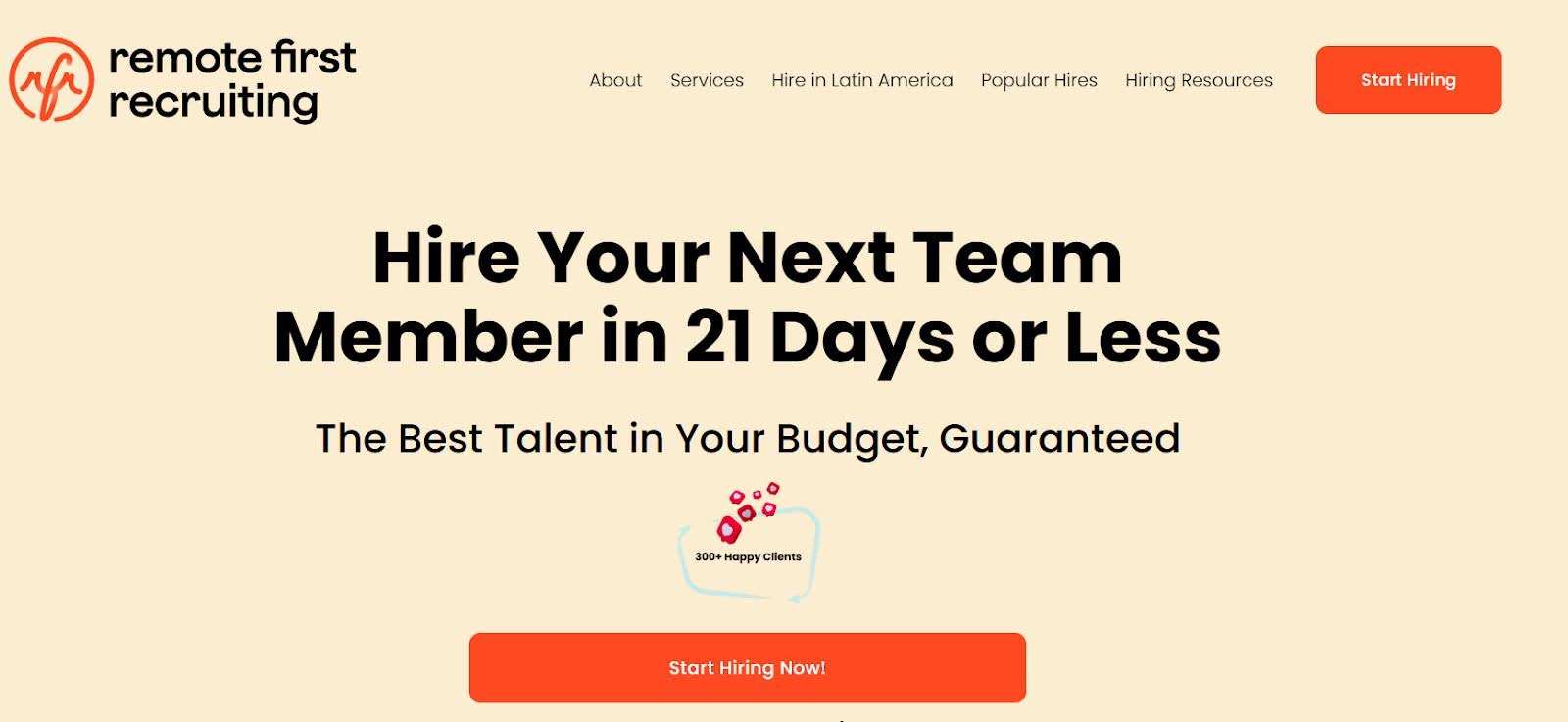
- Founded: 2017
- Headquarters: Austin, Texas
RemoteFirstRecruiting focuses exclusively on building teams for asynchronous-first companies, particularly in SaaS and product-led startups. Their flat-fee pricing model is attractive to early-stage businesses needing predictable recruitment costs. They average under 21 days from intake call to signed offer, which is a strong benchmark for remote hiring.
Their candidate pool is weighted toward professionals with prior distributed work experience, and they use structured work-sample tests to ensure hires can handle async documentation, project handoffs, and independent decision-making. The agency’s founders are themselves startup veterans, which means they understand the pressure of scaling with limited management bandwidth.
3) Crossover: Best for Global Enterprise Operations
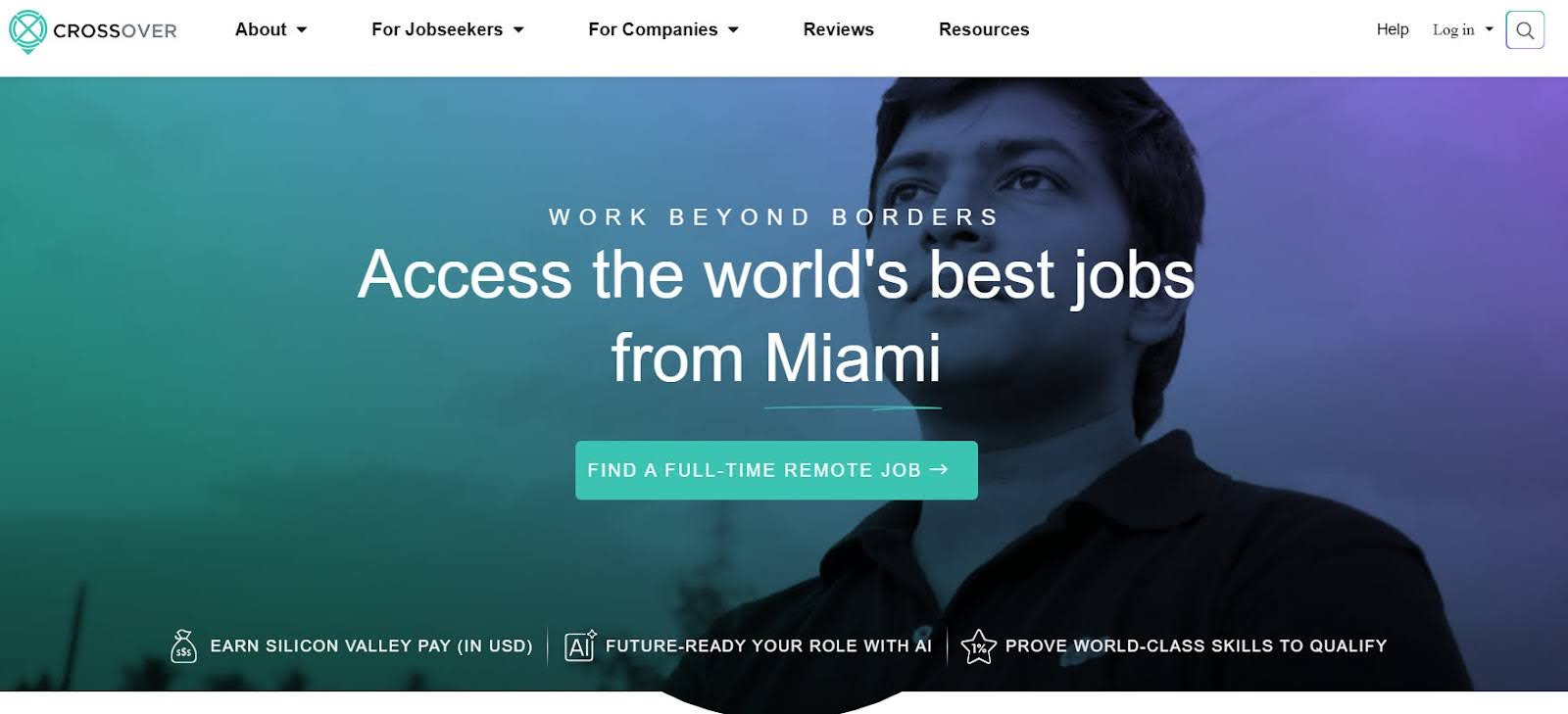
- Founded: 2014
- Headquarters: Austin, Texas
Crossover is known for its rigorous skills benchmarking process and only places full-time, long-term hires. Their reach spans over 100 countries, making them a solid fit for enterprises that require global coverage.
They rely heavily on assessments, including problem-solving tests, job simulations, and role-specific skills evaluations. This process can feel intensive for candidates, butit it yields consistent results in terms of performance and retention. Crossover’s model is less suited to casual or short-term roles but strong for companies that want to lock in high-performance operators and managers.
4) Turing: Best for Pre-Vetted Tech Talent
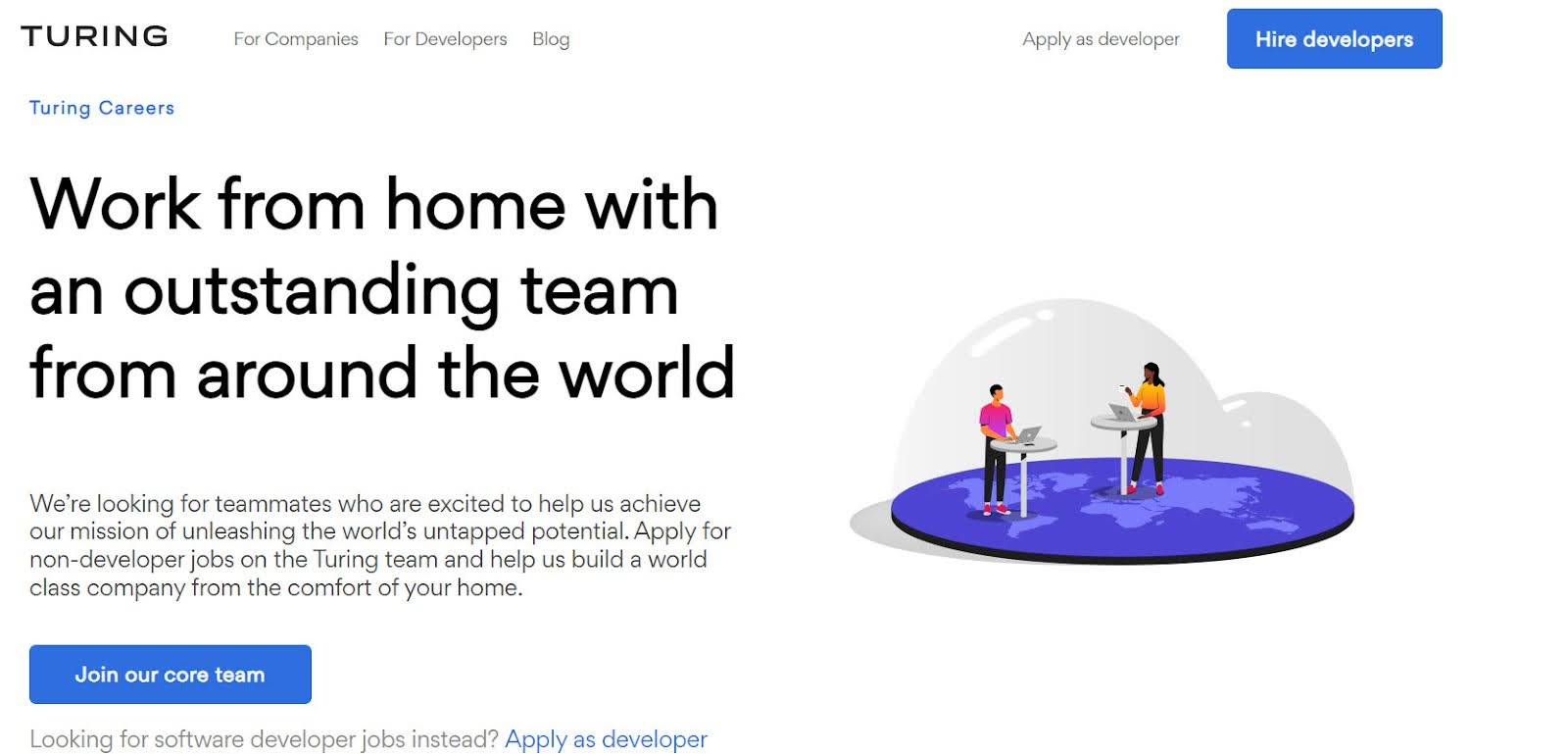
- Founded: 2018
- Headquarters: Palo Alto, California
Turing’s AI-driven platform matches companies with software developers from a global talent pool. Their focus is largely technical, with strong coverage of full-stack, backend, and specialized engineering roles. The vetting process combines coding challenges, system design interviews, and soft skills assessments.
While they have begun to expand into other functions, their core strength remains tech hiring. They also offer a “work for trial” option, letting companies test hires on real projects before committing to long-term contracts. This reduces risk for startups making critical technical hires.
5) DistantJob: Best for Remote Mid-Senior Tech Roles
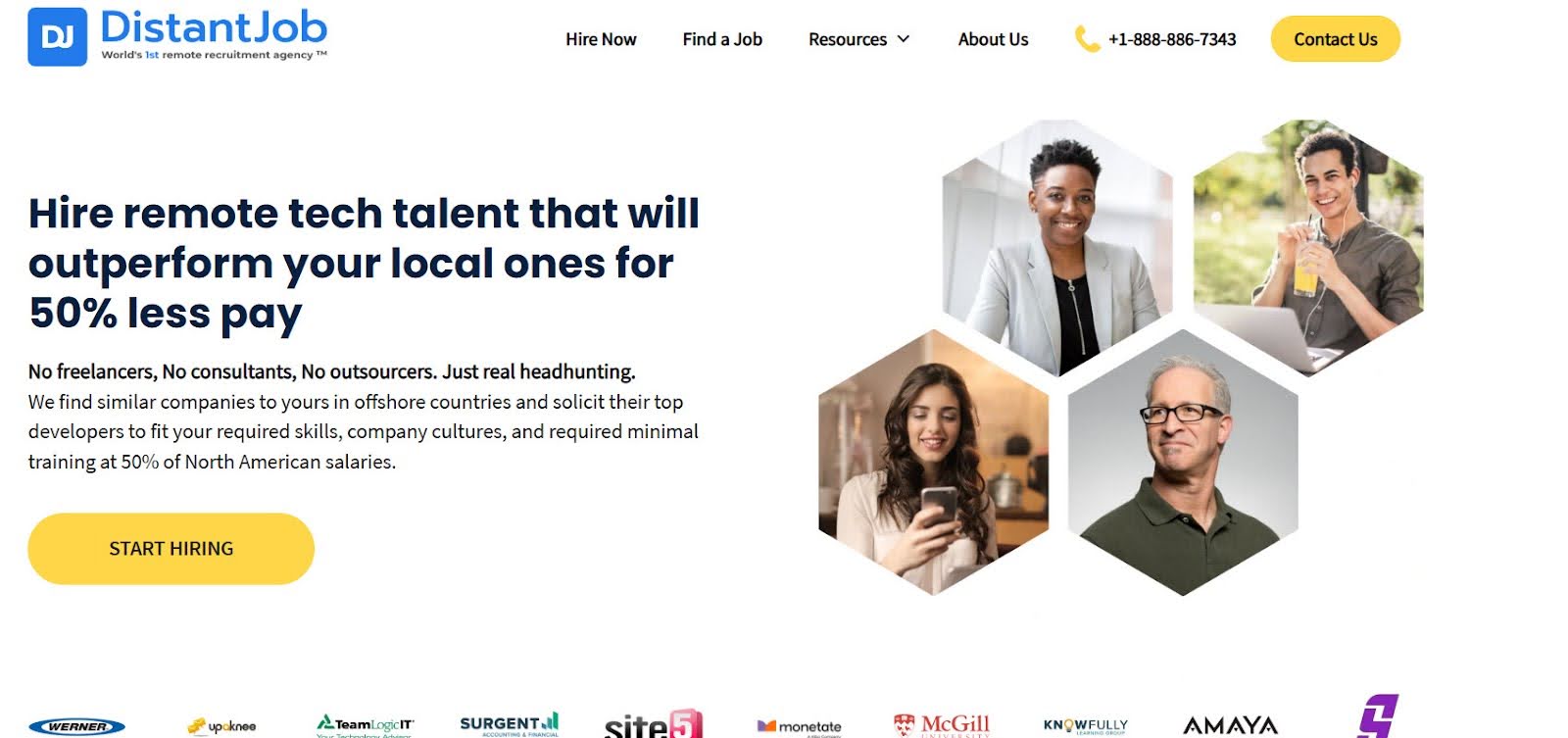
- Founded: 2008
- Headquarters: Montreal, Canada
DistantJob is a boutique remote recruitment agency specializing in long-term technical hires, often at the mid-to-senior level. Their candidate network is particularly strong in Eastern Europe, Latin America, and Asia.
What differentiates DistantJob is their emphasis on cultural fit. They interview extensively to understand not just the skills but the work habits and communication preferences of candidates. This attention to integration makes them a reliable choice for teams that value stability and cohesion in remote settings.
6) SupportNinja: Best for CX and Admin Support at Scale
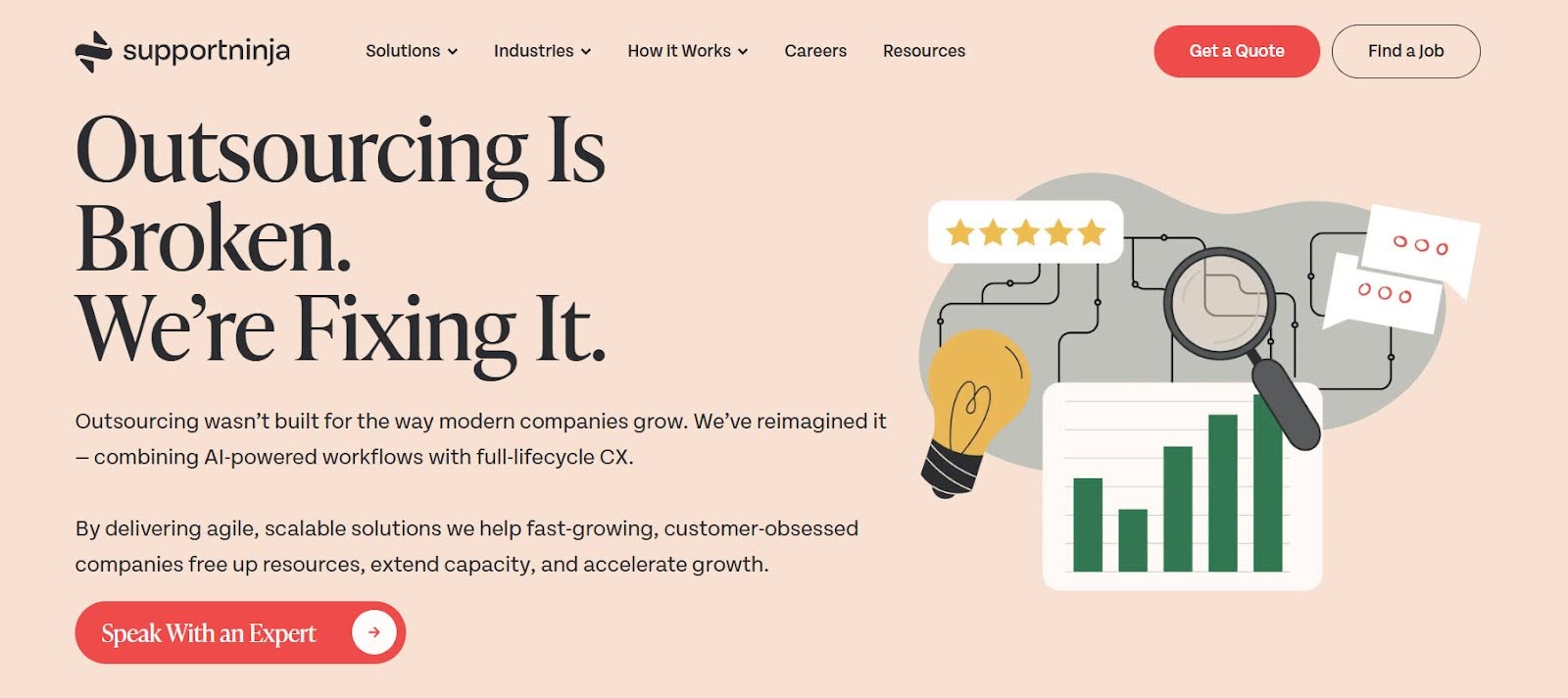
- Founded: 2015
- Headquarters: Austin, Texas
SupportNinja provides outsourced customer experience, back-office, and administrative support teams. They operate with a mix of on-site hubs and remote staff, giving clients flexibility depending on volume and complexity.
They excel at scaling support operations quickly, often standing up teams of 10+ agents in under a month. This speed, paired with their training and quality assurance programs, makes them a go-to option for e-commerce, SaaS, and service-based businesses that need customer support capacity without sacrificing quality.
7) Andela: Best for Engineering in Emerging Markets

- Founded: 2014
- Headquarters: New York, New York
Andela began as a developer training and placement company in Africa but has since expanded its reach to LATAM and other emerging markets. They remain focused on technical talent but now cover a wider range of engineering disciplines.
Their community-based approach means they invest in professional development for their talent pool, which improves retention and quality over time. For companies looking to diversify their tech teams while maintaining high skill standards, Andela offers both reach and rigor.
Remote Hiring Only Works When Fit Comes First
The promise of remote hiring is bigger talent pools, broader time zone coverage, and operational flexibility. But without the right partner, those benefits can get lost in misaligned workflows, unclear communication, or compliance headaches. The agencies on this list excel not because they can “find someone anywhere,” but because they understand how to match that someone to your exact way of working.
The best partnerships in remote recruitment feel less like a vendor relationship and more like an embedded extension of your operations team. They anticipate the risks, screen for the realities of distributed work, and help set your hires up for long-term success.
If you want to tap global talent without compromising productivity, start with an agency that treats remote as a discipline, not a checkbox. Somewhere is built around that mindset, and it’s why they consistently deliver teams that don’t just work from anywhere, but work well from anywhere.


































